Comprehensive Analysis of the UK Housing Market: 2009-2019
VerifiedAdded on 2023/01/10
|15
|3890
|55
Report
AI Summary
This report provides a comprehensive analysis of the UK housing market from 2009 to 2019. It begins by outlining the fluctuations in house prices during this period, noting key trends and regional variations. The study then delves into the economic determinants of these changes, including interest rates, consumer confidence, mortgage finance availability, demographic factors, and the impact of speculation and unemployment. Furthermore, the report examines the influence of government actions on the housing market, discussing both positive and negative impacts. Finally, it predicts the potential impact of COVID-19 on the UK housing market, considering factors such as economic uncertainty and shifts in consumer behavior. The report utilizes data from various sources, including the UK House Price Index and other market analyses, to support its findings and conclusions.
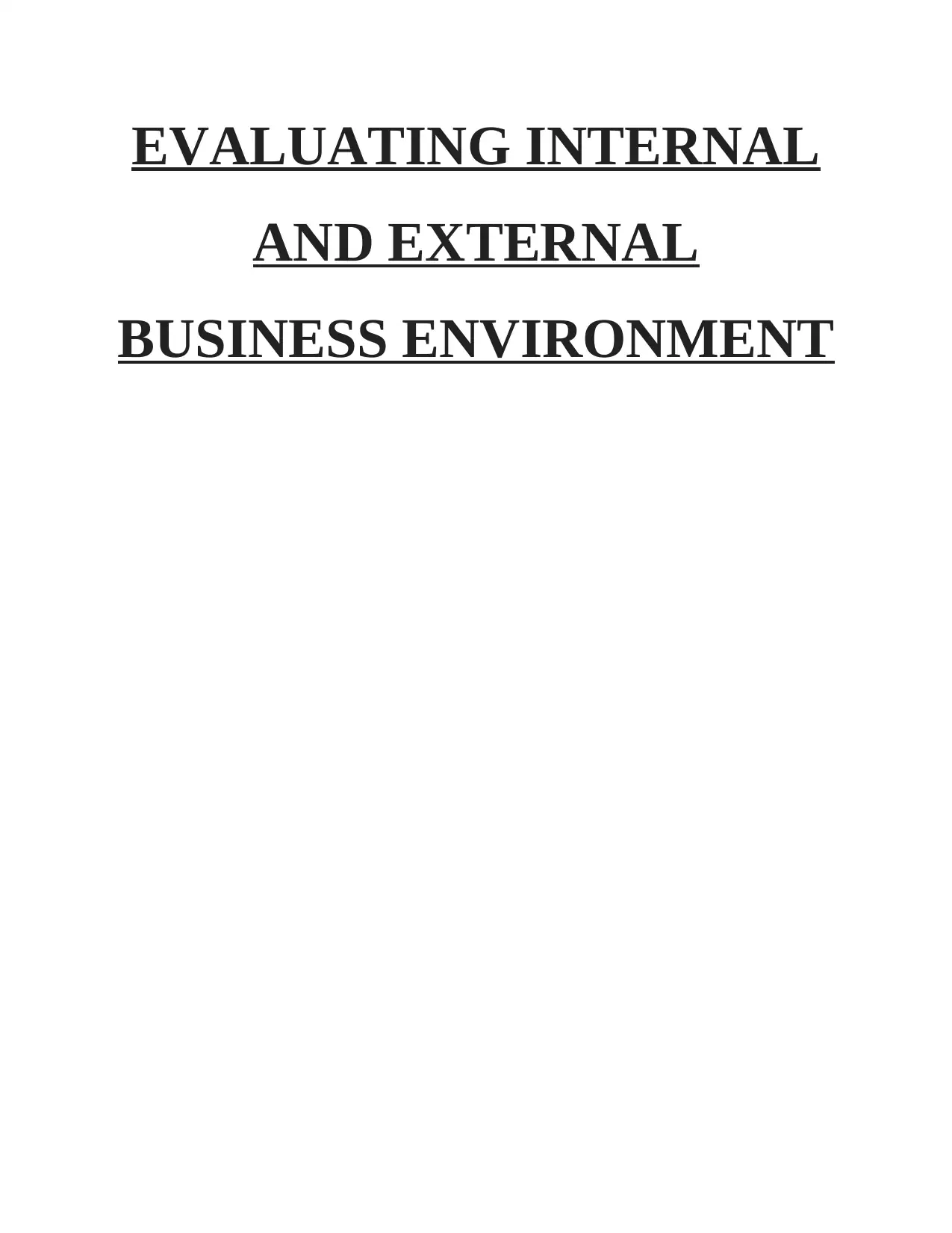
EVALUATING INTERNAL
AND EXTERNAL
BUSINESS ENVIRONMENT
AND EXTERNAL
BUSINESS ENVIRONMENT
Paraphrase This Document
Need a fresh take? Get an instant paraphrase of this document with our AI Paraphraser
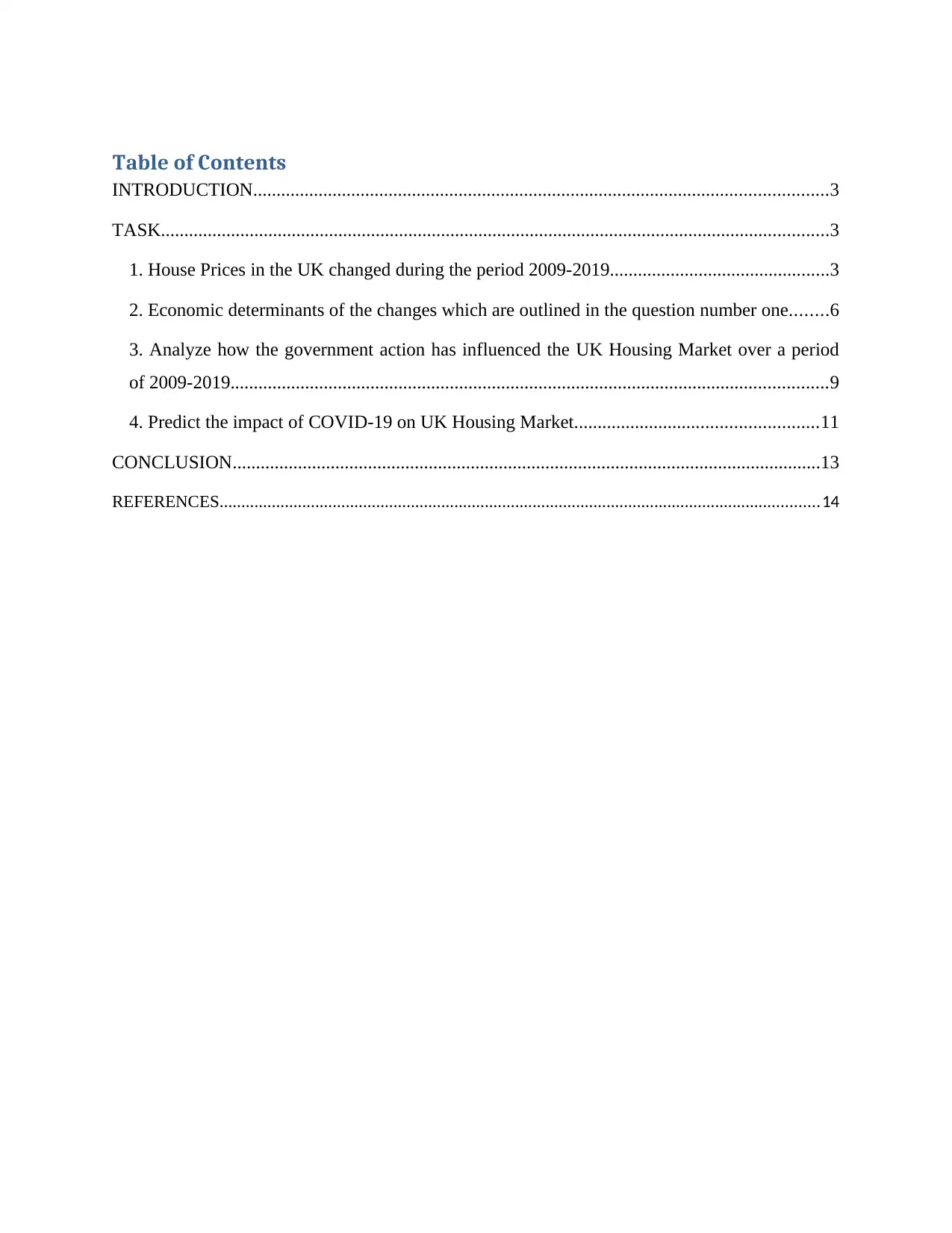
Table of Contents
INTRODUCTION...........................................................................................................................3
TASK...............................................................................................................................................3
1. House Prices in the UK changed during the period 2009-2019...............................................3
2. Economic determinants of the changes which are outlined in the question number one........6
3. Analyze how the government action has influenced the UK Housing Market over a period
of 2009-2019................................................................................................................................9
4. Predict the impact of COVID-19 on UK Housing Market....................................................11
CONCLUSION..............................................................................................................................13
REFERENCES..........................................................................................................................................14
INTRODUCTION...........................................................................................................................3
TASK...............................................................................................................................................3
1. House Prices in the UK changed during the period 2009-2019...............................................3
2. Economic determinants of the changes which are outlined in the question number one........6
3. Analyze how the government action has influenced the UK Housing Market over a period
of 2009-2019................................................................................................................................9
4. Predict the impact of COVID-19 on UK Housing Market....................................................11
CONCLUSION..............................................................................................................................13
REFERENCES..........................................................................................................................................14
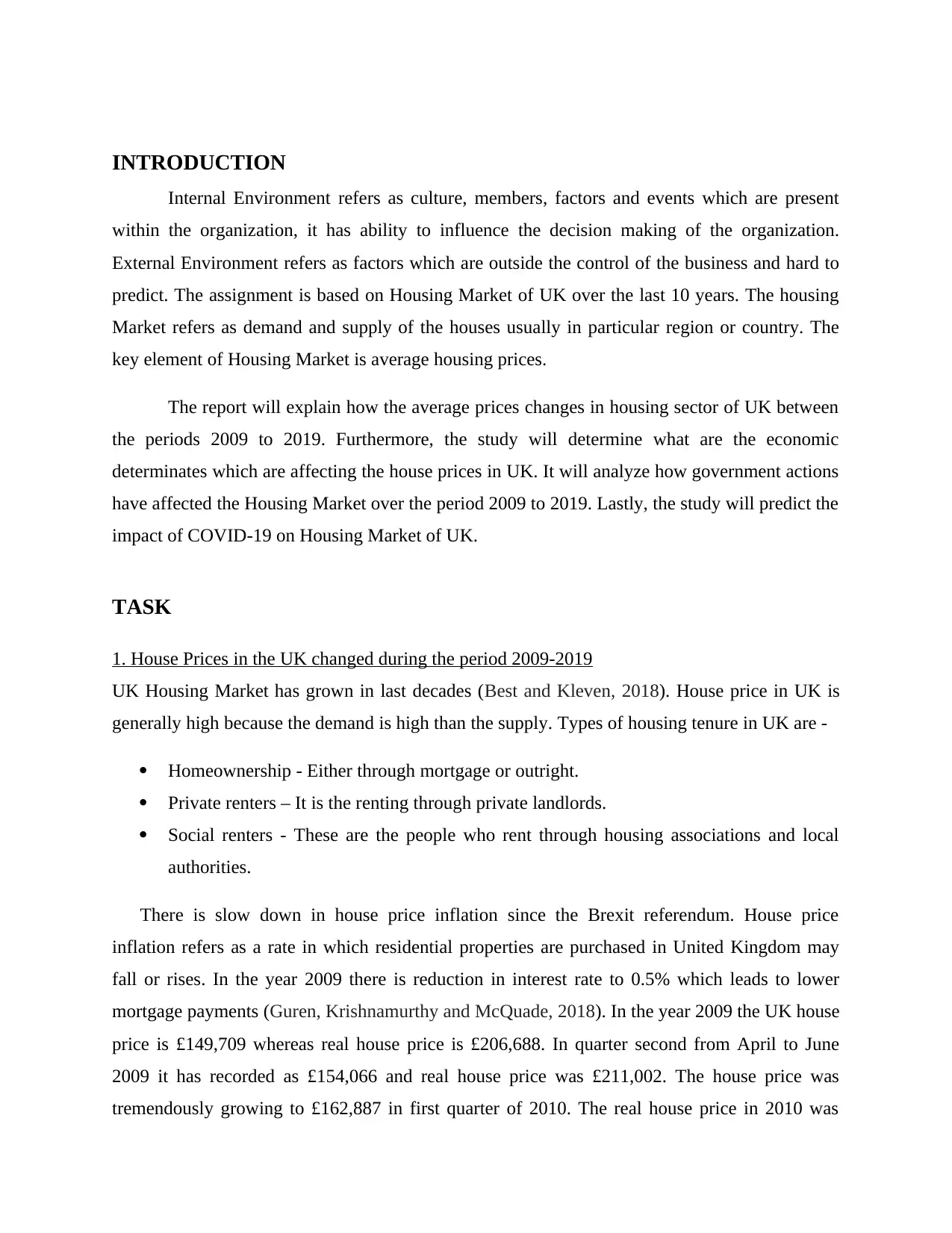
INTRODUCTION
Internal Environment refers as culture, members, factors and events which are present
within the organization, it has ability to influence the decision making of the organization.
External Environment refers as factors which are outside the control of the business and hard to
predict. The assignment is based on Housing Market of UK over the last 10 years. The housing
Market refers as demand and supply of the houses usually in particular region or country. The
key element of Housing Market is average housing prices.
The report will explain how the average prices changes in housing sector of UK between
the periods 2009 to 2019. Furthermore, the study will determine what are the economic
determinates which are affecting the house prices in UK. It will analyze how government actions
have affected the Housing Market over the period 2009 to 2019. Lastly, the study will predict the
impact of COVID-19 on Housing Market of UK.
TASK
1. House Prices in the UK changed during the period 2009-2019
UK Housing Market has grown in last decades (Best and Kleven, 2018). House price in UK is
generally high because the demand is high than the supply. Types of housing tenure in UK are -
Homeownership - Either through mortgage or outright.
Private renters – It is the renting through private landlords.
Social renters - These are the people who rent through housing associations and local
authorities.
There is slow down in house price inflation since the Brexit referendum. House price
inflation refers as a rate in which residential properties are purchased in United Kingdom may
fall or rises. In the year 2009 there is reduction in interest rate to 0.5% which leads to lower
mortgage payments (Guren, Krishnamurthy and McQuade, 2018). In the year 2009 the UK house
price is £149,709 whereas real house price is £206,688. In quarter second from April to June
2009 it has recorded as £154,066 and real house price was £211,002. The house price was
tremendously growing to £162,887 in first quarter of 2010. The real house price in 2010 was
Internal Environment refers as culture, members, factors and events which are present
within the organization, it has ability to influence the decision making of the organization.
External Environment refers as factors which are outside the control of the business and hard to
predict. The assignment is based on Housing Market of UK over the last 10 years. The housing
Market refers as demand and supply of the houses usually in particular region or country. The
key element of Housing Market is average housing prices.
The report will explain how the average prices changes in housing sector of UK between
the periods 2009 to 2019. Furthermore, the study will determine what are the economic
determinates which are affecting the house prices in UK. It will analyze how government actions
have affected the Housing Market over the period 2009 to 2019. Lastly, the study will predict the
impact of COVID-19 on Housing Market of UK.
TASK
1. House Prices in the UK changed during the period 2009-2019
UK Housing Market has grown in last decades (Best and Kleven, 2018). House price in UK is
generally high because the demand is high than the supply. Types of housing tenure in UK are -
Homeownership - Either through mortgage or outright.
Private renters – It is the renting through private landlords.
Social renters - These are the people who rent through housing associations and local
authorities.
There is slow down in house price inflation since the Brexit referendum. House price
inflation refers as a rate in which residential properties are purchased in United Kingdom may
fall or rises. In the year 2009 there is reduction in interest rate to 0.5% which leads to lower
mortgage payments (Guren, Krishnamurthy and McQuade, 2018). In the year 2009 the UK house
price is £149,709 whereas real house price is £206,688. In quarter second from April to June
2009 it has recorded as £154,066 and real house price was £211,002. The house price was
tremendously growing to £162,887 in first quarter of 2010. The real house price in 2010 was
⊘ This is a preview!⊘
Do you want full access?
Subscribe today to unlock all pages.

Trusted by 1+ million students worldwide
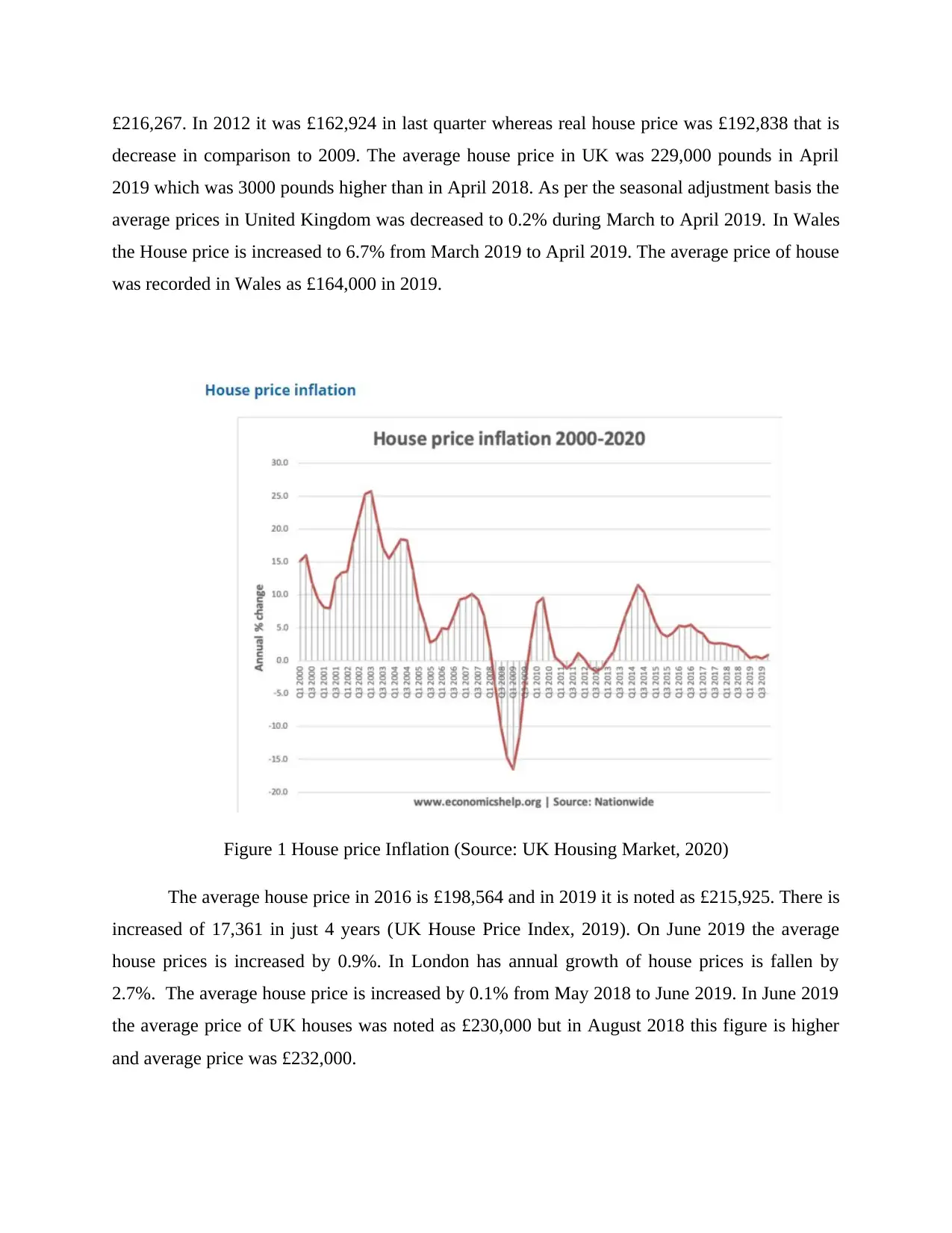
£216,267. In 2012 it was £162,924 in last quarter whereas real house price was £192,838 that is
decrease in comparison to 2009. The average house price in UK was 229,000 pounds in April
2019 which was 3000 pounds higher than in April 2018. As per the seasonal adjustment basis the
average prices in United Kingdom was decreased to 0.2% during March to April 2019. In Wales
the House price is increased to 6.7% from March 2019 to April 2019. The average price of house
was recorded in Wales as £164,000 in 2019.
Figure 1 House price Inflation (Source: UK Housing Market, 2020)
The average house price in 2016 is £198,564 and in 2019 it is noted as £215,925. There is
increased of 17,361 in just 4 years (UK House Price Index, 2019). On June 2019 the average
house prices is increased by 0.9%. In London has annual growth of house prices is fallen by
2.7%. The average house price is increased by 0.1% from May 2018 to June 2019. In June 2019
the average price of UK houses was noted as £230,000 but in August 2018 this figure is higher
and average price was £232,000.
decrease in comparison to 2009. The average house price in UK was 229,000 pounds in April
2019 which was 3000 pounds higher than in April 2018. As per the seasonal adjustment basis the
average prices in United Kingdom was decreased to 0.2% during March to April 2019. In Wales
the House price is increased to 6.7% from March 2019 to April 2019. The average price of house
was recorded in Wales as £164,000 in 2019.
Figure 1 House price Inflation (Source: UK Housing Market, 2020)
The average house price in 2016 is £198,564 and in 2019 it is noted as £215,925. There is
increased of 17,361 in just 4 years (UK House Price Index, 2019). On June 2019 the average
house prices is increased by 0.9%. In London has annual growth of house prices is fallen by
2.7%. The average house price is increased by 0.1% from May 2018 to June 2019. In June 2019
the average price of UK houses was noted as £230,000 but in August 2018 this figure is higher
and average price was £232,000.
Paraphrase This Document
Need a fresh take? Get an instant paraphrase of this document with our AI Paraphraser
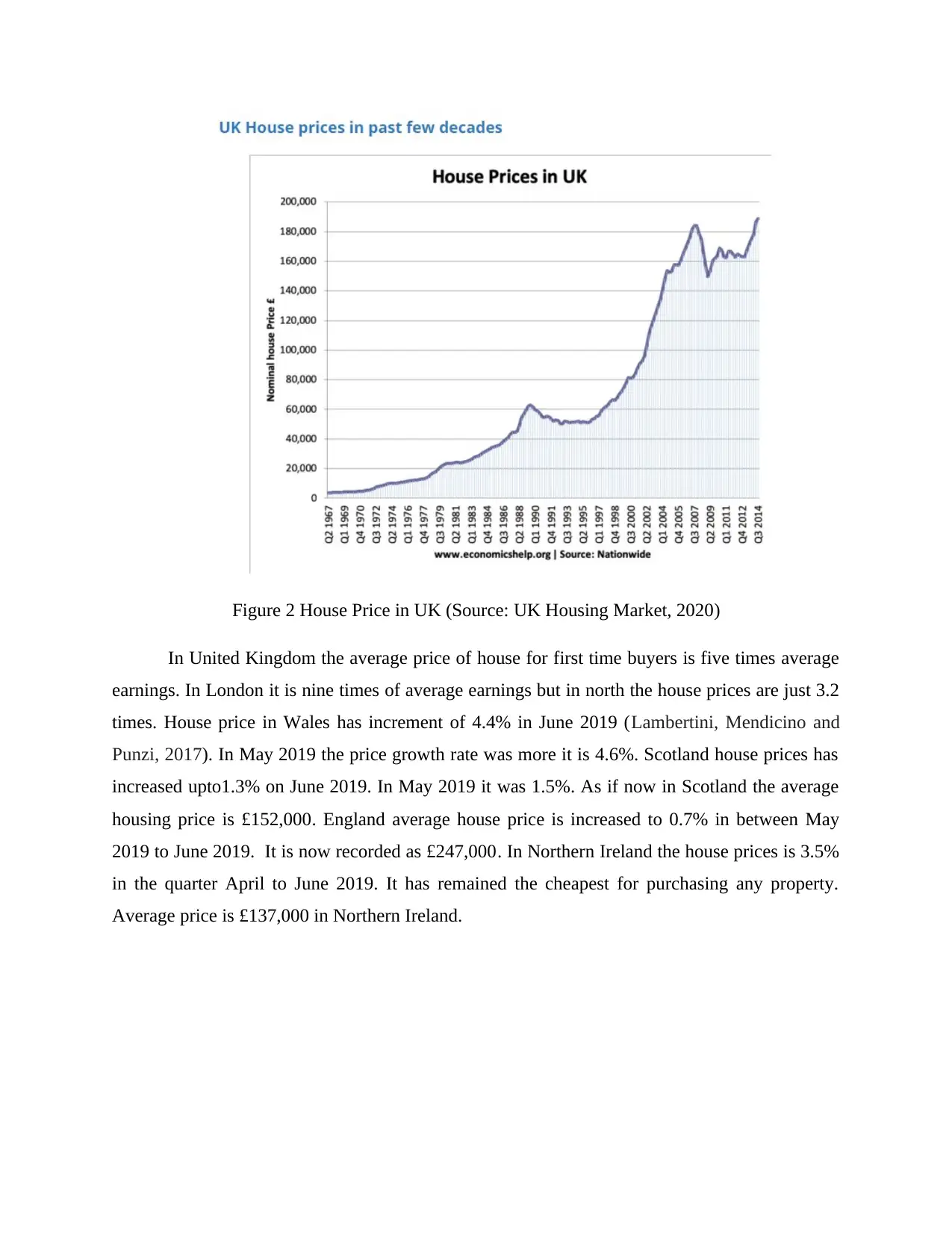
Figure 2 House Price in UK (Source: UK Housing Market, 2020)
In United Kingdom the average price of house for first time buyers is five times average
earnings. In London it is nine times of average earnings but in north the house prices are just 3.2
times. House price in Wales has increment of 4.4% in June 2019 (Lambertini, Mendicino and
Punzi, 2017). In May 2019 the price growth rate was more it is 4.6%. Scotland house prices has
increased upto1.3% on June 2019. In May 2019 it was 1.5%. As if now in Scotland the average
housing price is £152,000. England average house price is increased to 0.7% in between May
2019 to June 2019. It is now recorded as £247,000. In Northern Ireland the house prices is 3.5%
in the quarter April to June 2019. It has remained the cheapest for purchasing any property.
Average price is £137,000 in Northern Ireland.
In United Kingdom the average price of house for first time buyers is five times average
earnings. In London it is nine times of average earnings but in north the house prices are just 3.2
times. House price in Wales has increment of 4.4% in June 2019 (Lambertini, Mendicino and
Punzi, 2017). In May 2019 the price growth rate was more it is 4.6%. Scotland house prices has
increased upto1.3% on June 2019. In May 2019 it was 1.5%. As if now in Scotland the average
housing price is £152,000. England average house price is increased to 0.7% in between May
2019 to June 2019. It is now recorded as £247,000. In Northern Ireland the house prices is 3.5%
in the quarter April to June 2019. It has remained the cheapest for purchasing any property.
Average price is £137,000 in Northern Ireland.
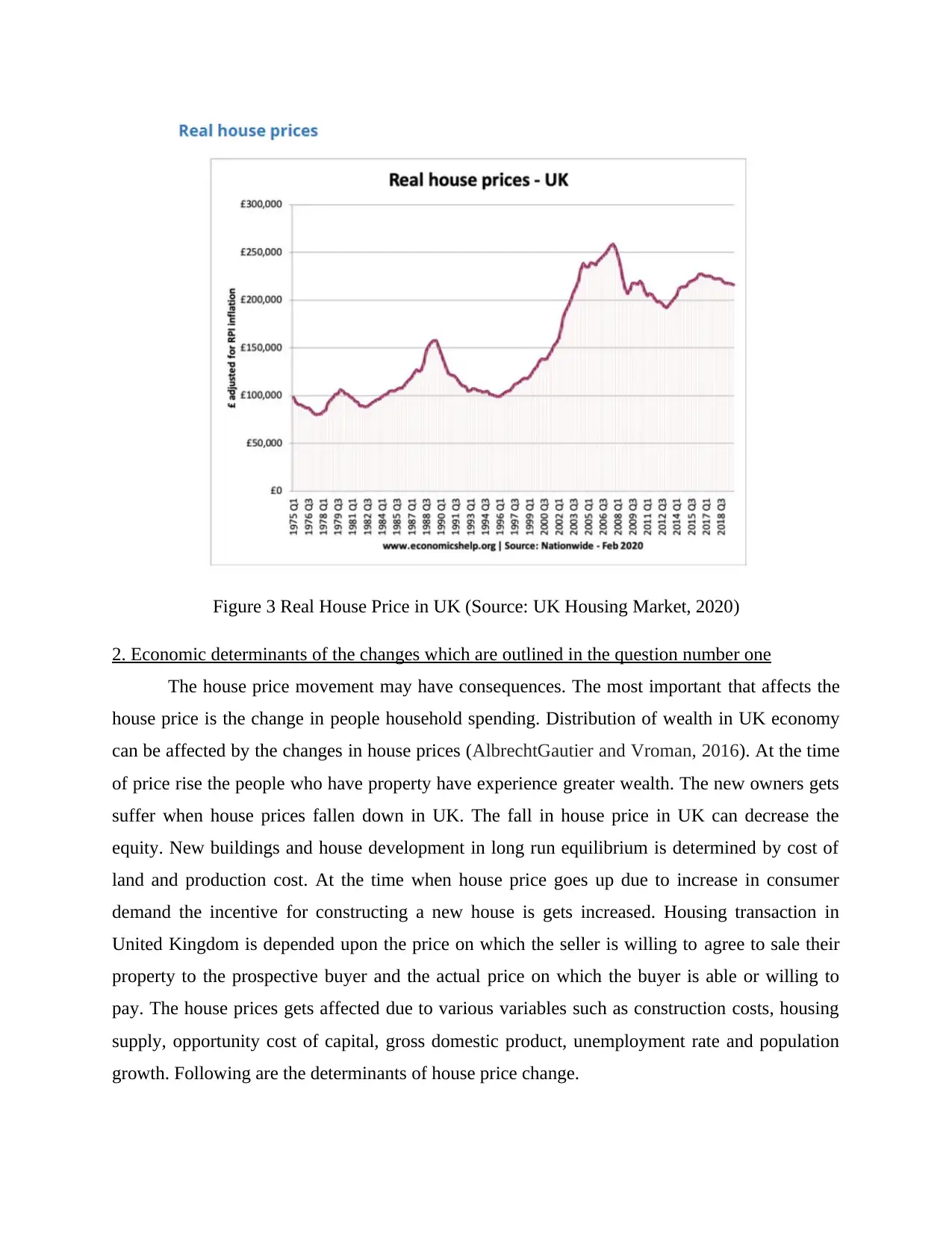
Figure 3 Real House Price in UK (Source: UK Housing Market, 2020)
2. Economic determinants of the changes which are outlined in the question number one
The house price movement may have consequences. The most important that affects the
house price is the change in people household spending. Distribution of wealth in UK economy
can be affected by the changes in house prices (AlbrechtGautier and Vroman, 2016). At the time
of price rise the people who have property have experience greater wealth. The new owners gets
suffer when house prices fallen down in UK. The fall in house price in UK can decrease the
equity. New buildings and house development in long run equilibrium is determined by cost of
land and production cost. At the time when house price goes up due to increase in consumer
demand the incentive for constructing a new house is gets increased. Housing transaction in
United Kingdom is depended upon the price on which the seller is willing to agree to sale their
property to the prospective buyer and the actual price on which the buyer is able or willing to
pay. The house prices gets affected due to various variables such as construction costs, housing
supply, opportunity cost of capital, gross domestic product, unemployment rate and population
growth. Following are the determinants of house price change.
2. Economic determinants of the changes which are outlined in the question number one
The house price movement may have consequences. The most important that affects the
house price is the change in people household spending. Distribution of wealth in UK economy
can be affected by the changes in house prices (AlbrechtGautier and Vroman, 2016). At the time
of price rise the people who have property have experience greater wealth. The new owners gets
suffer when house prices fallen down in UK. The fall in house price in UK can decrease the
equity. New buildings and house development in long run equilibrium is determined by cost of
land and production cost. At the time when house price goes up due to increase in consumer
demand the incentive for constructing a new house is gets increased. Housing transaction in
United Kingdom is depended upon the price on which the seller is willing to agree to sale their
property to the prospective buyer and the actual price on which the buyer is able or willing to
pay. The house prices gets affected due to various variables such as construction costs, housing
supply, opportunity cost of capital, gross domestic product, unemployment rate and population
growth. Following are the determinants of house price change.
⊘ This is a preview!⊘
Do you want full access?
Subscribe today to unlock all pages.

Trusted by 1+ million students worldwide
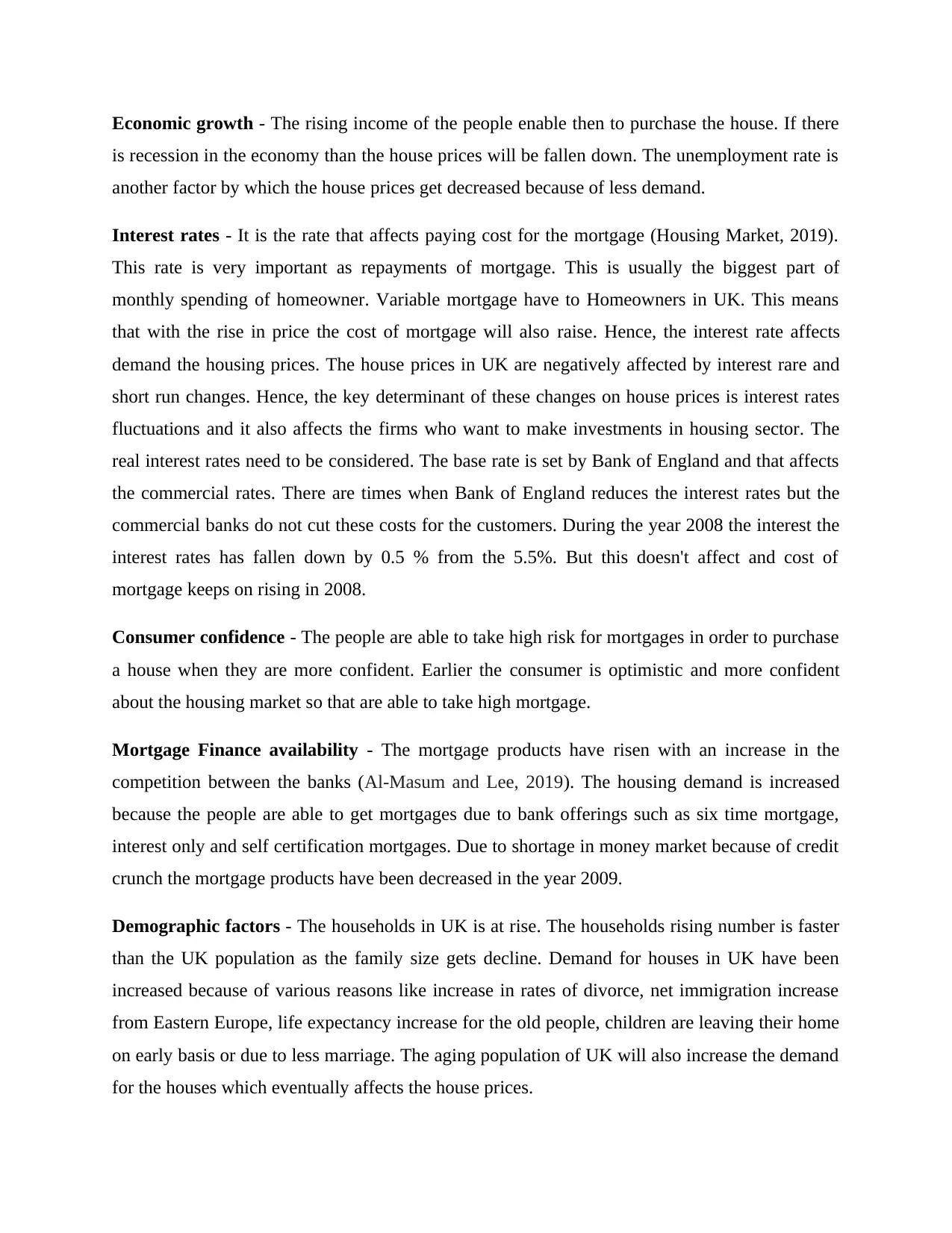
Economic growth - The rising income of the people enable then to purchase the house. If there
is recession in the economy than the house prices will be fallen down. The unemployment rate is
another factor by which the house prices get decreased because of less demand.
Interest rates - It is the rate that affects paying cost for the mortgage (Housing Market, 2019).
This rate is very important as repayments of mortgage. This is usually the biggest part of
monthly spending of homeowner. Variable mortgage have to Homeowners in UK. This means
that with the rise in price the cost of mortgage will also raise. Hence, the interest rate affects
demand the housing prices. The house prices in UK are negatively affected by interest rare and
short run changes. Hence, the key determinant of these changes on house prices is interest rates
fluctuations and it also affects the firms who want to make investments in housing sector. The
real interest rates need to be considered. The base rate is set by Bank of England and that affects
the commercial rates. There are times when Bank of England reduces the interest rates but the
commercial banks do not cut these costs for the customers. During the year 2008 the interest the
interest rates has fallen down by 0.5 % from the 5.5%. But this doesn't affect and cost of
mortgage keeps on rising in 2008.
Consumer confidence - The people are able to take high risk for mortgages in order to purchase
a house when they are more confident. Earlier the consumer is optimistic and more confident
about the housing market so that are able to take high mortgage.
Mortgage Finance availability - The mortgage products have risen with an increase in the
competition between the banks (Al-Masum and Lee, 2019). The housing demand is increased
because the people are able to get mortgages due to bank offerings such as six time mortgage,
interest only and self certification mortgages. Due to shortage in money market because of credit
crunch the mortgage products have been decreased in the year 2009.
Demographic factors - The households in UK is at rise. The households rising number is faster
than the UK population as the family size gets decline. Demand for houses in UK have been
increased because of various reasons like increase in rates of divorce, net immigration increase
from Eastern Europe, life expectancy increase for the old people, children are leaving their home
on early basis or due to less marriage. The aging population of UK will also increase the demand
for the houses which eventually affects the house prices.
is recession in the economy than the house prices will be fallen down. The unemployment rate is
another factor by which the house prices get decreased because of less demand.
Interest rates - It is the rate that affects paying cost for the mortgage (Housing Market, 2019).
This rate is very important as repayments of mortgage. This is usually the biggest part of
monthly spending of homeowner. Variable mortgage have to Homeowners in UK. This means
that with the rise in price the cost of mortgage will also raise. Hence, the interest rate affects
demand the housing prices. The house prices in UK are negatively affected by interest rare and
short run changes. Hence, the key determinant of these changes on house prices is interest rates
fluctuations and it also affects the firms who want to make investments in housing sector. The
real interest rates need to be considered. The base rate is set by Bank of England and that affects
the commercial rates. There are times when Bank of England reduces the interest rates but the
commercial banks do not cut these costs for the customers. During the year 2008 the interest the
interest rates has fallen down by 0.5 % from the 5.5%. But this doesn't affect and cost of
mortgage keeps on rising in 2008.
Consumer confidence - The people are able to take high risk for mortgages in order to purchase
a house when they are more confident. Earlier the consumer is optimistic and more confident
about the housing market so that are able to take high mortgage.
Mortgage Finance availability - The mortgage products have risen with an increase in the
competition between the banks (Al-Masum and Lee, 2019). The housing demand is increased
because the people are able to get mortgages due to bank offerings such as six time mortgage,
interest only and self certification mortgages. Due to shortage in money market because of credit
crunch the mortgage products have been decreased in the year 2009.
Demographic factors - The households in UK is at rise. The households rising number is faster
than the UK population as the family size gets decline. Demand for houses in UK have been
increased because of various reasons like increase in rates of divorce, net immigration increase
from Eastern Europe, life expectancy increase for the old people, children are leaving their home
on early basis or due to less marriage. The aging population of UK will also increase the demand
for the houses which eventually affects the house prices.
Paraphrase This Document
Need a fresh take? Get an instant paraphrase of this document with our AI Paraphraser
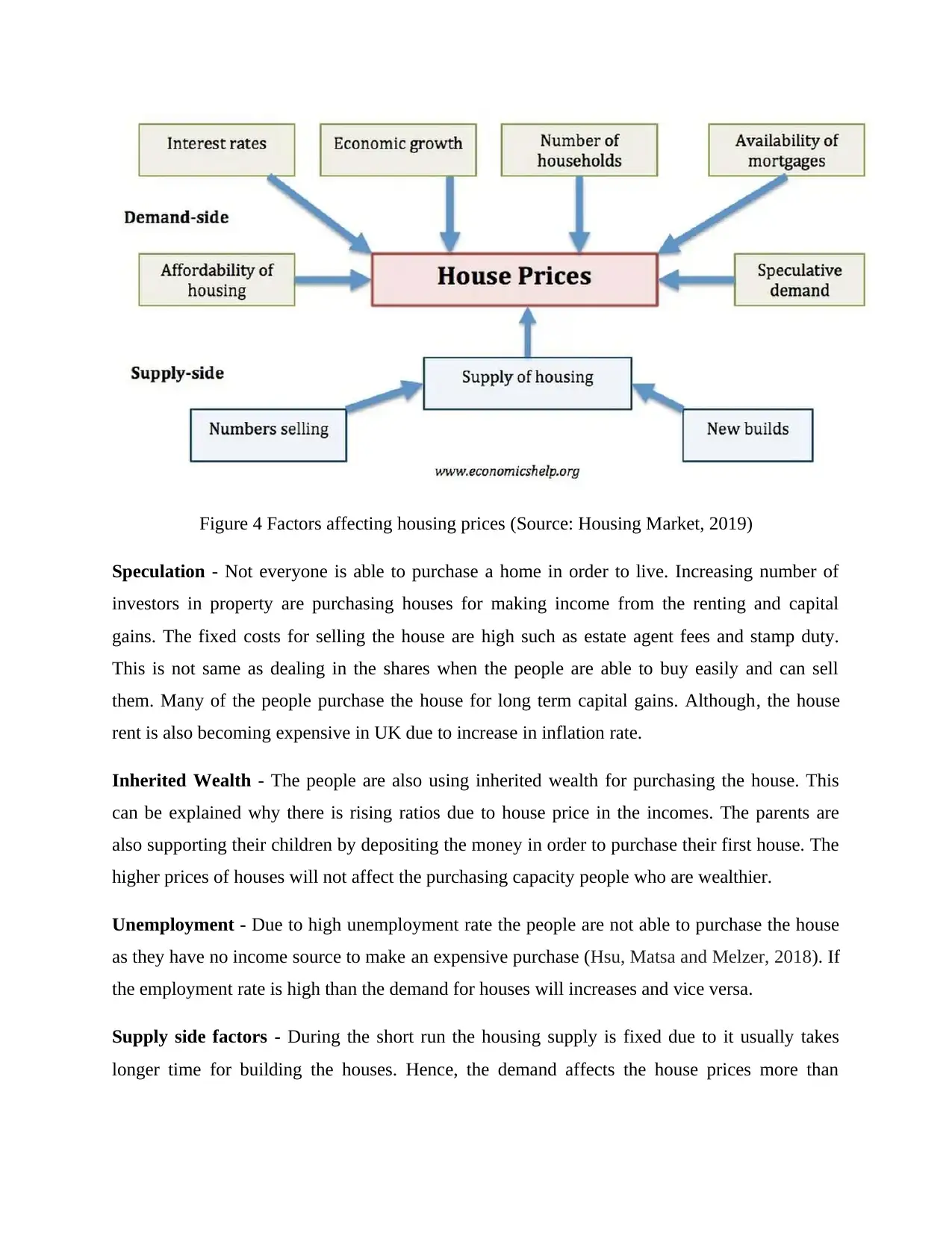
Figure 4 Factors affecting housing prices (Source: Housing Market, 2019)
Speculation - Not everyone is able to purchase a home in order to live. Increasing number of
investors in property are purchasing houses for making income from the renting and capital
gains. The fixed costs for selling the house are high such as estate agent fees and stamp duty.
This is not same as dealing in the shares when the people are able to buy easily and can sell
them. Many of the people purchase the house for long term capital gains. Although, the house
rent is also becoming expensive in UK due to increase in inflation rate.
Inherited Wealth - The people are also using inherited wealth for purchasing the house. This
can be explained why there is rising ratios due to house price in the incomes. The parents are
also supporting their children by depositing the money in order to purchase their first house. The
higher prices of houses will not affect the purchasing capacity people who are wealthier.
Unemployment - Due to high unemployment rate the people are not able to purchase the house
as they have no income source to make an expensive purchase (Hsu, Matsa and Melzer, 2018). If
the employment rate is high than the demand for houses will increases and vice versa.
Supply side factors - During the short run the housing supply is fixed due to it usually takes
longer time for building the houses. Hence, the demand affects the house prices more than
Speculation - Not everyone is able to purchase a home in order to live. Increasing number of
investors in property are purchasing houses for making income from the renting and capital
gains. The fixed costs for selling the house are high such as estate agent fees and stamp duty.
This is not same as dealing in the shares when the people are able to buy easily and can sell
them. Many of the people purchase the house for long term capital gains. Although, the house
rent is also becoming expensive in UK due to increase in inflation rate.
Inherited Wealth - The people are also using inherited wealth for purchasing the house. This
can be explained why there is rising ratios due to house price in the incomes. The parents are
also supporting their children by depositing the money in order to purchase their first house. The
higher prices of houses will not affect the purchasing capacity people who are wealthier.
Unemployment - Due to high unemployment rate the people are not able to purchase the house
as they have no income source to make an expensive purchase (Hsu, Matsa and Melzer, 2018). If
the employment rate is high than the demand for houses will increases and vice versa.
Supply side factors - During the short run the housing supply is fixed due to it usually takes
longer time for building the houses. Hence, the demand affects the house prices more than
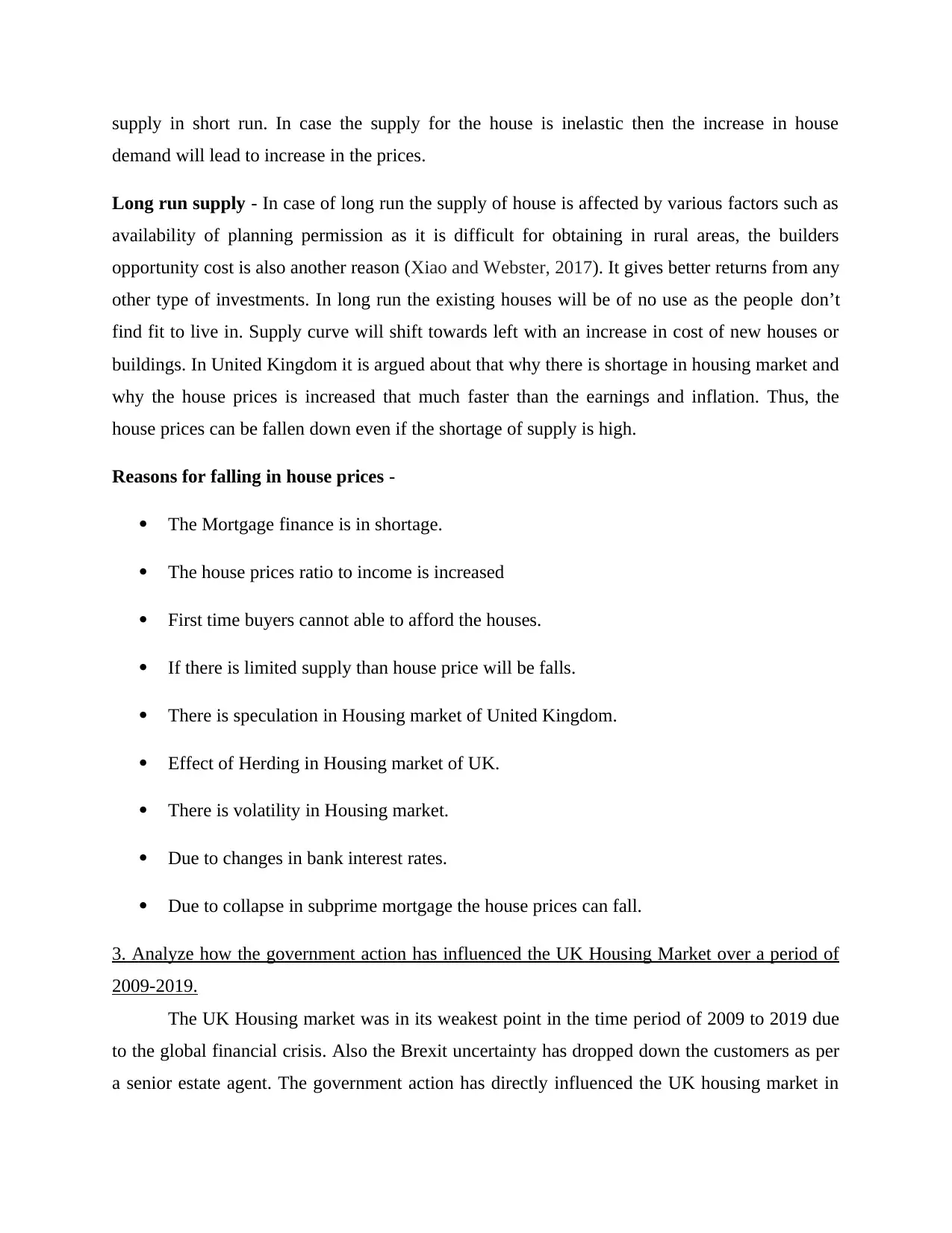
supply in short run. In case the supply for the house is inelastic then the increase in house
demand will lead to increase in the prices.
Long run supply - In case of long run the supply of house is affected by various factors such as
availability of planning permission as it is difficult for obtaining in rural areas, the builders
opportunity cost is also another reason (Xiao and Webster, 2017). It gives better returns from any
other type of investments. In long run the existing houses will be of no use as the people don’t
find fit to live in. Supply curve will shift towards left with an increase in cost of new houses or
buildings. In United Kingdom it is argued about that why there is shortage in housing market and
why the house prices is increased that much faster than the earnings and inflation. Thus, the
house prices can be fallen down even if the shortage of supply is high.
Reasons for falling in house prices -
The Mortgage finance is in shortage.
The house prices ratio to income is increased
First time buyers cannot able to afford the houses.
If there is limited supply than house price will be falls.
There is speculation in Housing market of United Kingdom.
Effect of Herding in Housing market of UK.
There is volatility in Housing market.
Due to changes in bank interest rates.
Due to collapse in subprime mortgage the house prices can fall.
3. Analyze how the government action has influenced the UK Housing Market over a period of
2009-2019.
The UK Housing market was in its weakest point in the time period of 2009 to 2019 due
to the global financial crisis. Also the Brexit uncertainty has dropped down the customers as per
a senior estate agent. The government action has directly influenced the UK housing market in
demand will lead to increase in the prices.
Long run supply - In case of long run the supply of house is affected by various factors such as
availability of planning permission as it is difficult for obtaining in rural areas, the builders
opportunity cost is also another reason (Xiao and Webster, 2017). It gives better returns from any
other type of investments. In long run the existing houses will be of no use as the people don’t
find fit to live in. Supply curve will shift towards left with an increase in cost of new houses or
buildings. In United Kingdom it is argued about that why there is shortage in housing market and
why the house prices is increased that much faster than the earnings and inflation. Thus, the
house prices can be fallen down even if the shortage of supply is high.
Reasons for falling in house prices -
The Mortgage finance is in shortage.
The house prices ratio to income is increased
First time buyers cannot able to afford the houses.
If there is limited supply than house price will be falls.
There is speculation in Housing market of United Kingdom.
Effect of Herding in Housing market of UK.
There is volatility in Housing market.
Due to changes in bank interest rates.
Due to collapse in subprime mortgage the house prices can fall.
3. Analyze how the government action has influenced the UK Housing Market over a period of
2009-2019.
The UK Housing market was in its weakest point in the time period of 2009 to 2019 due
to the global financial crisis. Also the Brexit uncertainty has dropped down the customers as per
a senior estate agent. The government action has directly influenced the UK housing market in
⊘ This is a preview!⊘
Do you want full access?
Subscribe today to unlock all pages.

Trusted by 1+ million students worldwide
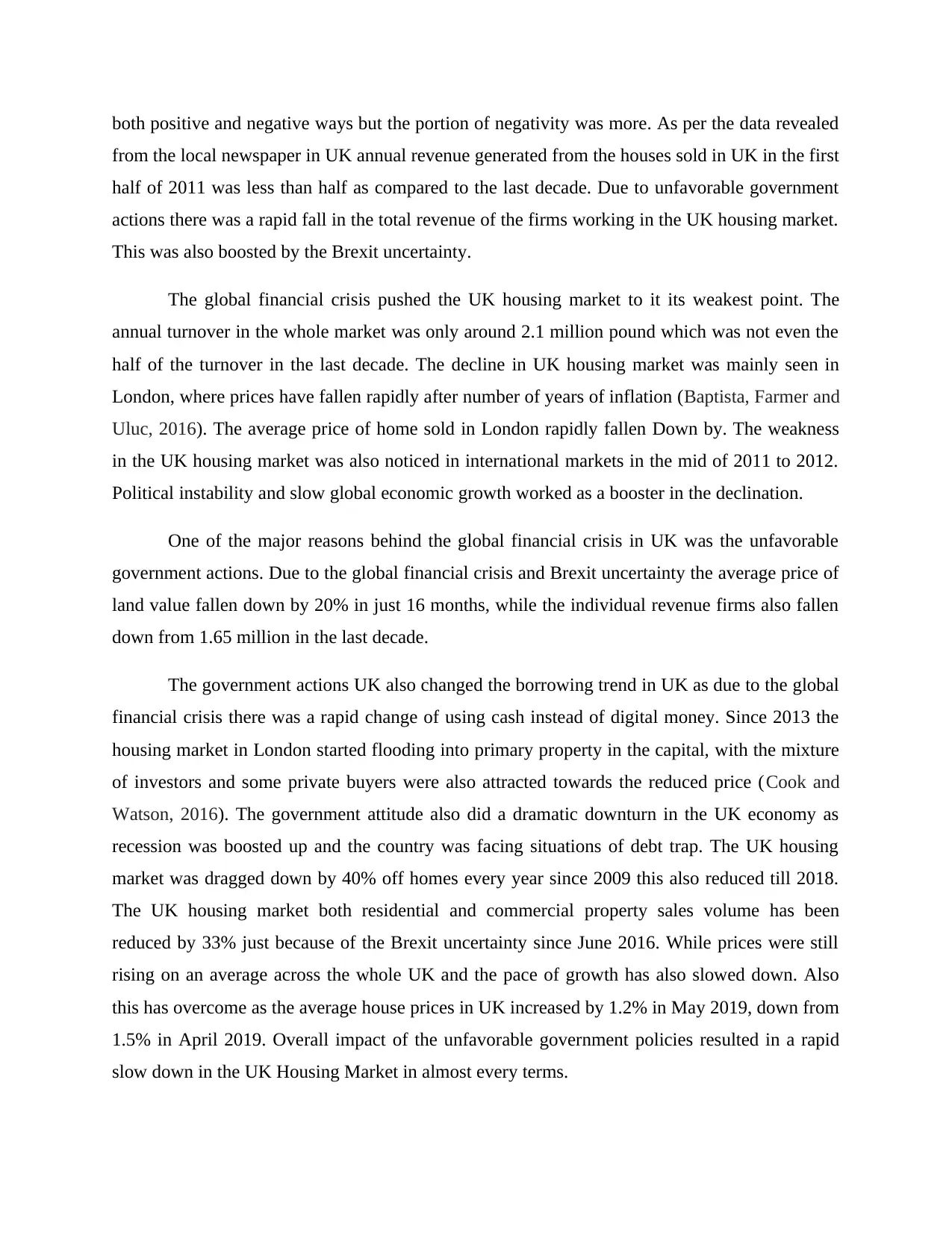
both positive and negative ways but the portion of negativity was more. As per the data revealed
from the local newspaper in UK annual revenue generated from the houses sold in UK in the first
half of 2011 was less than half as compared to the last decade. Due to unfavorable government
actions there was a rapid fall in the total revenue of the firms working in the UK housing market.
This was also boosted by the Brexit uncertainty.
The global financial crisis pushed the UK housing market to it its weakest point. The
annual turnover in the whole market was only around 2.1 million pound which was not even the
half of the turnover in the last decade. The decline in UK housing market was mainly seen in
London, where prices have fallen rapidly after number of years of inflation (Baptista, Farmer and
Uluc, 2016). The average price of home sold in London rapidly fallen Down by. The weakness
in the UK housing market was also noticed in international markets in the mid of 2011 to 2012.
Political instability and slow global economic growth worked as a booster in the declination.
One of the major reasons behind the global financial crisis in UK was the unfavorable
government actions. Due to the global financial crisis and Brexit uncertainty the average price of
land value fallen down by 20% in just 16 months, while the individual revenue firms also fallen
down from 1.65 million in the last decade.
The government actions UK also changed the borrowing trend in UK as due to the global
financial crisis there was a rapid change of using cash instead of digital money. Since 2013 the
housing market in London started flooding into primary property in the capital, with the mixture
of investors and some private buyers were also attracted towards the reduced price (Cook and
Watson, 2016). The government attitude also did a dramatic downturn in the UK economy as
recession was boosted up and the country was facing situations of debt trap. The UK housing
market was dragged down by 40% off homes every year since 2009 this also reduced till 2018.
The UK housing market both residential and commercial property sales volume has been
reduced by 33% just because of the Brexit uncertainty since June 2016. While prices were still
rising on an average across the whole UK and the pace of growth has also slowed down. Also
this has overcome as the average house prices in UK increased by 1.2% in May 2019, down from
1.5% in April 2019. Overall impact of the unfavorable government policies resulted in a rapid
slow down in the UK Housing Market in almost every terms.
from the local newspaper in UK annual revenue generated from the houses sold in UK in the first
half of 2011 was less than half as compared to the last decade. Due to unfavorable government
actions there was a rapid fall in the total revenue of the firms working in the UK housing market.
This was also boosted by the Brexit uncertainty.
The global financial crisis pushed the UK housing market to it its weakest point. The
annual turnover in the whole market was only around 2.1 million pound which was not even the
half of the turnover in the last decade. The decline in UK housing market was mainly seen in
London, where prices have fallen rapidly after number of years of inflation (Baptista, Farmer and
Uluc, 2016). The average price of home sold in London rapidly fallen Down by. The weakness
in the UK housing market was also noticed in international markets in the mid of 2011 to 2012.
Political instability and slow global economic growth worked as a booster in the declination.
One of the major reasons behind the global financial crisis in UK was the unfavorable
government actions. Due to the global financial crisis and Brexit uncertainty the average price of
land value fallen down by 20% in just 16 months, while the individual revenue firms also fallen
down from 1.65 million in the last decade.
The government actions UK also changed the borrowing trend in UK as due to the global
financial crisis there was a rapid change of using cash instead of digital money. Since 2013 the
housing market in London started flooding into primary property in the capital, with the mixture
of investors and some private buyers were also attracted towards the reduced price (Cook and
Watson, 2016). The government attitude also did a dramatic downturn in the UK economy as
recession was boosted up and the country was facing situations of debt trap. The UK housing
market was dragged down by 40% off homes every year since 2009 this also reduced till 2018.
The UK housing market both residential and commercial property sales volume has been
reduced by 33% just because of the Brexit uncertainty since June 2016. While prices were still
rising on an average across the whole UK and the pace of growth has also slowed down. Also
this has overcome as the average house prices in UK increased by 1.2% in May 2019, down from
1.5% in April 2019. Overall impact of the unfavorable government policies resulted in a rapid
slow down in the UK Housing Market in almost every terms.
Paraphrase This Document
Need a fresh take? Get an instant paraphrase of this document with our AI Paraphraser
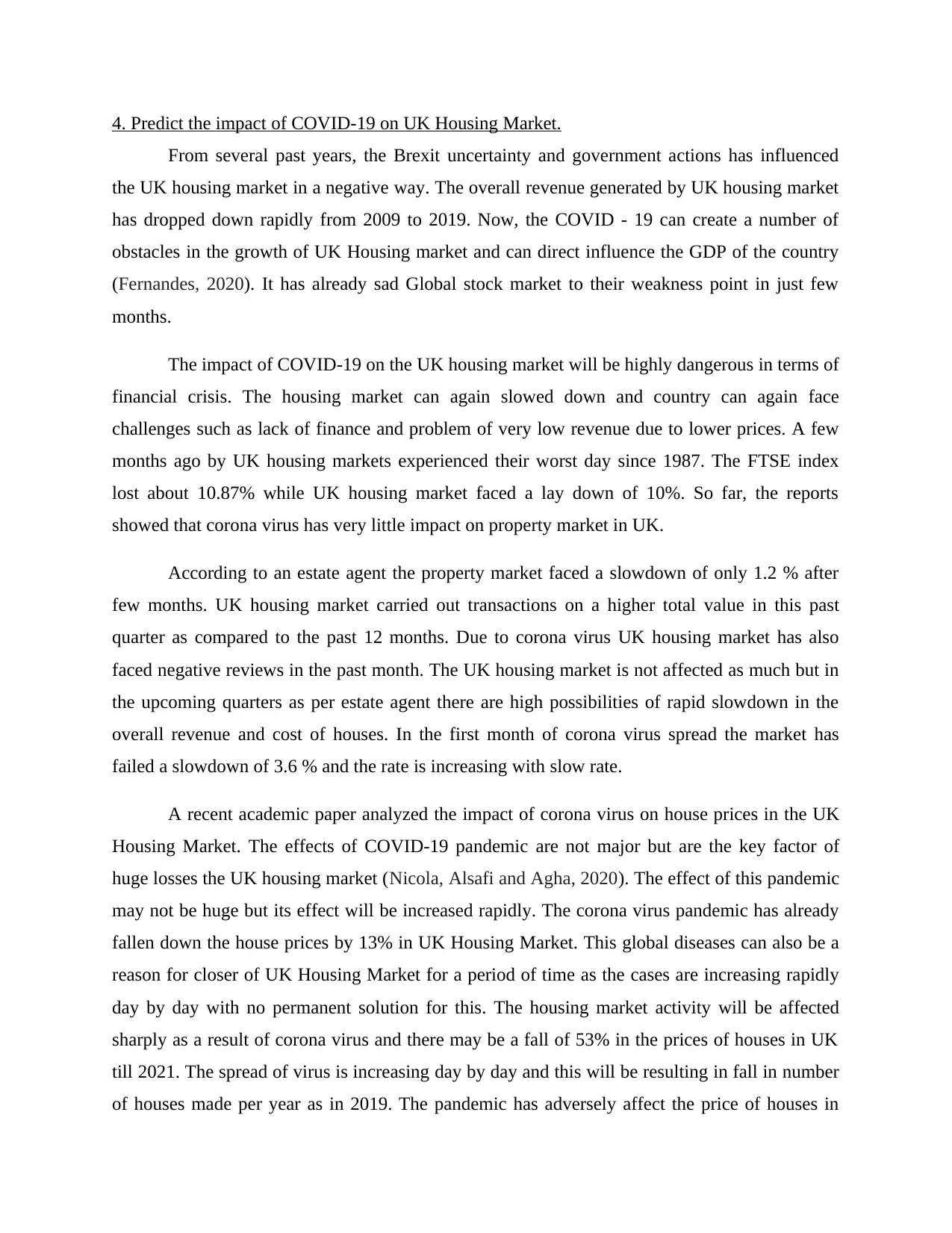
4. Predict the impact of COVID-19 on UK Housing Market.
From several past years, the Brexit uncertainty and government actions has influenced
the UK housing market in a negative way. The overall revenue generated by UK housing market
has dropped down rapidly from 2009 to 2019. Now, the COVID - 19 can create a number of
obstacles in the growth of UK Housing market and can direct influence the GDP of the country
(Fernandes, 2020). It has already sad Global stock market to their weakness point in just few
months.
The impact of COVID-19 on the UK housing market will be highly dangerous in terms of
financial crisis. The housing market can again slowed down and country can again face
challenges such as lack of finance and problem of very low revenue due to lower prices. A few
months ago by UK housing markets experienced their worst day since 1987. The FTSE index
lost about 10.87% while UK housing market faced a lay down of 10%. So far, the reports
showed that corona virus has very little impact on property market in UK.
According to an estate agent the property market faced a slowdown of only 1.2 % after
few months. UK housing market carried out transactions on a higher total value in this past
quarter as compared to the past 12 months. Due to corona virus UK housing market has also
faced negative reviews in the past month. The UK housing market is not affected as much but in
the upcoming quarters as per estate agent there are high possibilities of rapid slowdown in the
overall revenue and cost of houses. In the first month of corona virus spread the market has
failed a slowdown of 3.6 % and the rate is increasing with slow rate.
A recent academic paper analyzed the impact of corona virus on house prices in the UK
Housing Market. The effects of COVID-19 pandemic are not major but are the key factor of
huge losses the UK housing market (Nicola, Alsafi and Agha, 2020). The effect of this pandemic
may not be huge but its effect will be increased rapidly. The corona virus pandemic has already
fallen down the house prices by 13% in UK Housing Market. This global diseases can also be a
reason for closer of UK Housing Market for a period of time as the cases are increasing rapidly
day by day with no permanent solution for this. The housing market activity will be affected
sharply as a result of corona virus and there may be a fall of 53% in the prices of houses in UK
till 2021. The spread of virus is increasing day by day and this will be resulting in fall in number
of houses made per year as in 2019. The pandemic has adversely affect the price of houses in
From several past years, the Brexit uncertainty and government actions has influenced
the UK housing market in a negative way. The overall revenue generated by UK housing market
has dropped down rapidly from 2009 to 2019. Now, the COVID - 19 can create a number of
obstacles in the growth of UK Housing market and can direct influence the GDP of the country
(Fernandes, 2020). It has already sad Global stock market to their weakness point in just few
months.
The impact of COVID-19 on the UK housing market will be highly dangerous in terms of
financial crisis. The housing market can again slowed down and country can again face
challenges such as lack of finance and problem of very low revenue due to lower prices. A few
months ago by UK housing markets experienced their worst day since 1987. The FTSE index
lost about 10.87% while UK housing market faced a lay down of 10%. So far, the reports
showed that corona virus has very little impact on property market in UK.
According to an estate agent the property market faced a slowdown of only 1.2 % after
few months. UK housing market carried out transactions on a higher total value in this past
quarter as compared to the past 12 months. Due to corona virus UK housing market has also
faced negative reviews in the past month. The UK housing market is not affected as much but in
the upcoming quarters as per estate agent there are high possibilities of rapid slowdown in the
overall revenue and cost of houses. In the first month of corona virus spread the market has
failed a slowdown of 3.6 % and the rate is increasing with slow rate.
A recent academic paper analyzed the impact of corona virus on house prices in the UK
Housing Market. The effects of COVID-19 pandemic are not major but are the key factor of
huge losses the UK housing market (Nicola, Alsafi and Agha, 2020). The effect of this pandemic
may not be huge but its effect will be increased rapidly. The corona virus pandemic has already
fallen down the house prices by 13% in UK Housing Market. This global diseases can also be a
reason for closer of UK Housing Market for a period of time as the cases are increasing rapidly
day by day with no permanent solution for this. The housing market activity will be affected
sharply as a result of corona virus and there may be a fall of 53% in the prices of houses in UK
till 2021. The spread of virus is increasing day by day and this will be resulting in fall in number
of houses made per year as in 2019. The pandemic has adversely affect the price of houses in

UK, the drop was estimated around 25% is now estimate up to 53% which may result in a huge
loss in the GDP of the country that is contributed by the UK Housing Market.
loss in the GDP of the country that is contributed by the UK Housing Market.
⊘ This is a preview!⊘
Do you want full access?
Subscribe today to unlock all pages.

Trusted by 1+ million students worldwide
1 out of 15
Related Documents
Your All-in-One AI-Powered Toolkit for Academic Success.
+13062052269
info@desklib.com
Available 24*7 on WhatsApp / Email
![[object Object]](/_next/static/media/star-bottom.7253800d.svg)
Unlock your academic potential
Copyright © 2020–2026 A2Z Services. All Rights Reserved. Developed and managed by ZUCOL.





